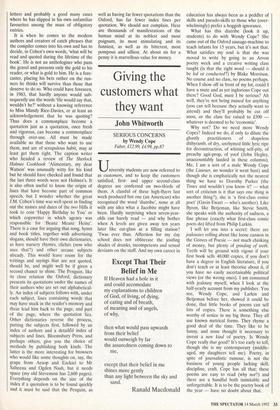Giving the customers what they want
John Whitworth
SERIOUS CONCERNS by Wendy Cope Faber, £12.99, £4.99, pp.87 University students are now referred to as customers, and to keep the customers satisfied, first- and upper second-class degrees are conferred on two-thirds of them. A classful of these high-flyers last week produced but one (an American) who recognised the word 'diatribe', none at all with any idea what a Jacobite might have been. Hardly surprising when seven-year- olds can barely read — and why bother when A levels are given away ten years later like cut-glass at a filling station? 'Twas ever thus. Affection for my day school does not obliterate the jostling shades of drunks, incompetents and sexual deviants on the staff. And my own career in
education has always been as a peddler of skills and pseudo-skills to those who (over- whelmingly) prefer a hoggish ignorance.
What has this diatribe (look it up, students) to do with Wendy Cope? She came out of the Oxford sausage-machine to teach infants for 15 years, but it's not that. What satisfies my soul is that she was moved to write by going to an Arvon poetry week and a creative writing class taught (is that the right word — should it be led or conducted?) by Blake Morrison. No course and no class, no poems perhaps. When I show off in front of my lot, could I have a mute and as yet inglorious Cope out there? Good God, must I be serious? Ah well, they're not being trained for anything (you can tell because they actually want to attend) and they'll probably be cut off soon, or the class fee raised to £500 whatever is deemed to be 'economic'.
Why not? Do we need more Wendy Copes? Indeed we do, if only to dilute the ghastly practitioners of shapeless dithyramb, of dry, unrhymed little lyric ripe for deconstruction, of whining self-pity, of preachy agit-prop, of yoof (John Hegley, unaccountably lauded in these columns). Me, I am a sort of a male Wendy Cope (the Listener, no wonder it went bust) and though she is emphatically not the nearest thing we have to Dorothy Parker (the Times and wouldn't you know it? — what sort of criticism is it that says one thing is another thing?), she is 'a first-class comic poet' (Gavin Ewart — who's another). Like Byron, like Betjeman, like Stevie Smith, she speaks with the authority of sadness, a fine phrase (exactly what first-class comic poets do) lifted from Philip Larkin.
I will let you into a secret: there are jealousies rolling about like loose cannon in the Groves of Poesie — not much chinking of money, but plenty of grinding of teeth. Teeth will be ground with vigour if your first book sells 40,000 copies, if you don't have a degree in English literature, if you don't teach or at least theorise about it, if you have no easily ascertainable political views (or the wrong ones). I am consumed with jealousy myself, when I look at the half-yearly account from my publisher. You see, Wendy Cope, and Larkin and Betjeman before her, showed it could be done, that little books of poems can sell lots of copies. There is something else worthy of notice in my big three. They all use known metrical forms. They rhyme a good deal of the time. They like to be funny, and none thought it necessary to invent a new kind of poetry. Is Wendy Cope really that good? It's too early to tell,
though she is my contemporary (middle- aged, my daughters tell me). Poetry, in spite of journalistic rumour, is not the business of young people lacking skill, discipline, craft. Cope has all that; these
poems are easy to read (why not?) and there are a handful both inimitable and unforgettable. It is to be the poetry book of the year — have no doubt about that.


























































 Previous page
Previous page